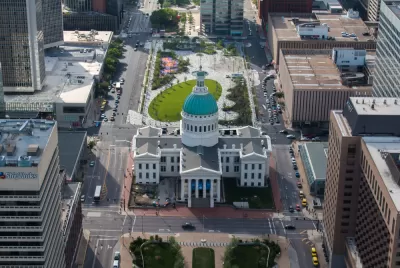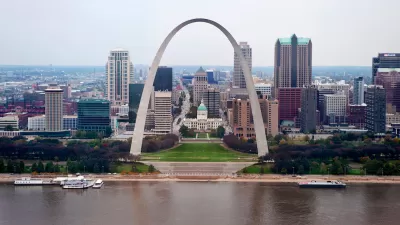Ten St. Louis organizations worked together to pin down mayoral candidates on concrete questions about racial equity—but first they had come to consensus on what issues to focus on.

Tired of hearing the standard rhetoric from our elected officials—promises of lowering the crime rate, easing the tax burden, and repairing potholes—a group of organizations in St. Louis banded together and partnered with local media to ensure that racial equity was the central topic of political debate during the city’s 2017 mayoral race.
A Once-in-a-Decade Opportunity
In 2016 St. Louis City Mayor Francis Slay announced he would not run for re-election. After a historic four terms, this created an opportunity for mayoral candidates to shape new visions for St. Louis.
Among the 10 most segregated metropolitan regions in the country, St. Louis often simmers with unease from decades of racial inequity. In the summer of 2014, an African-American man, 18-year-old Michael Brown, was fatally shot by a police officer in nearby Ferguson. Many St. Louis residents and taxpayers were deeply disappointed in the way city officials responded to the unrest in Ferguson, which crossed into the city’s boundaries. It was clear that this was a critical election year.
Community members and organizations wanted more than just the typical rhetoric from city leaders. There was a need to ensure that community voices and expectations were heard. There was a need to understand how the candidates planned to address inequities in the city and whether they were willing to take a hard stance—publicly—on equity issues important to St. Louis residents, businesses, faith communities, and nonprofits.
To prepare, a group of 10 local organizations focused on systemic change joined together to encourage candidates to address racial equity and make it a focal point in the pivotal election. The group first set its sights on hosting a mayoral forum that would be different from past forums by focusing on racial equity.
FULL STORY: Injecting Racial Equity into an Election Cycle in St. Louis

Study: Maui’s Plan to Convert Vacation Rentals to Long-Term Housing Could Cause Nearly $1 Billion Economic Loss
The plan would reduce visitor accommodation by 25,% resulting in 1,900 jobs lost.

North Texas Transit Leaders Tout Benefits of TOD for Growing Region
At a summit focused on transit-oriented development, policymakers discussed how North Texas’ expanded light rail system can serve as a tool for economic growth.

Why Should We Subsidize Public Transportation?
Many public transit agencies face financial stress due to rising costs, declining fare revenue, and declining subsidies. Transit advocates must provide a strong business case for increasing public transit funding.

How to Make US Trains Faster
Changes to boarding platforms and a switch to electric trains could improve U.S. passenger rail service without the added cost of high-speed rail.

Columbia’s Revitalized ‘Loop’ Is a Hub for Local Entrepreneurs
A focus on small businesses is helping a commercial corridor in Columbia, Missouri thrive.

Invasive Insect Threatens Minnesota’s Ash Forests
The Emerald Ash Borer is a rapidly spreading invasive pest threatening Minnesota’s ash trees, and homeowners are encouraged to plant diverse replacement species, avoid moving ash firewood, and monitor for signs of infestation.
Urban Design for Planners 1: Software Tools
This six-course series explores essential urban design concepts using open source software and equips planners with the tools they need to participate fully in the urban design process.
Planning for Universal Design
Learn the tools for implementing Universal Design in planning regulations.
City of Santa Clarita
Ascent Environmental
Institute for Housing and Urban Development Studies (IHS)
City of Grandview
Harvard GSD Executive Education
Toledo-Lucas County Plan Commissions
Salt Lake City
NYU Wagner Graduate School of Public Service





























